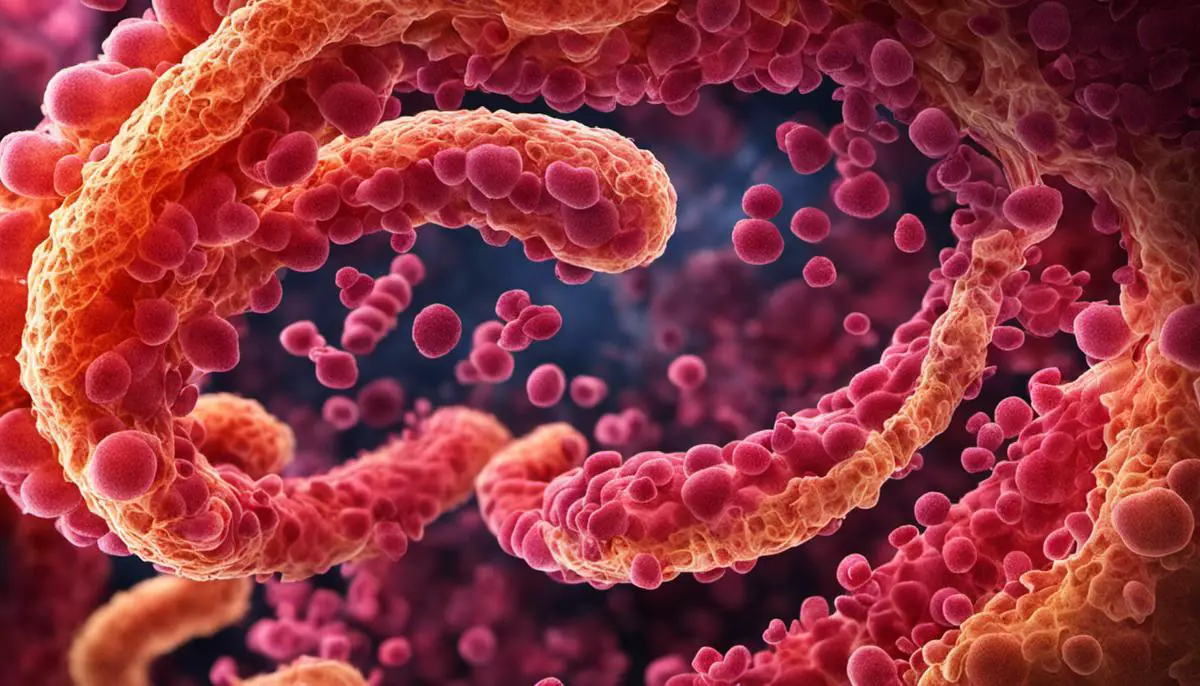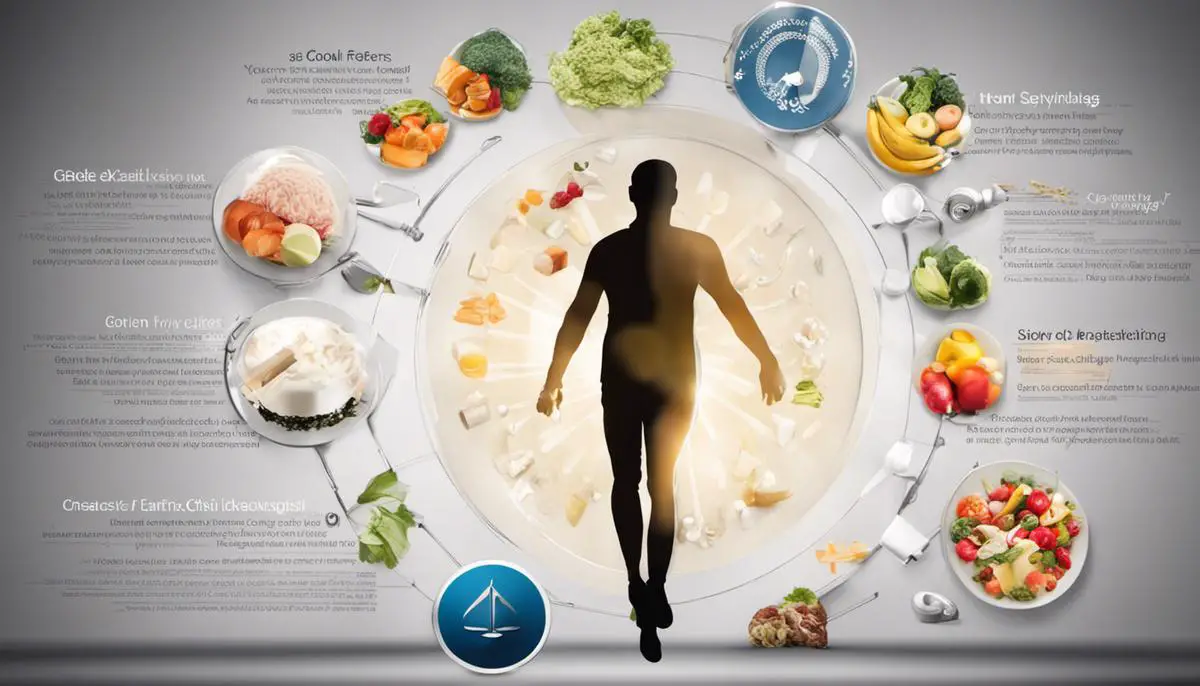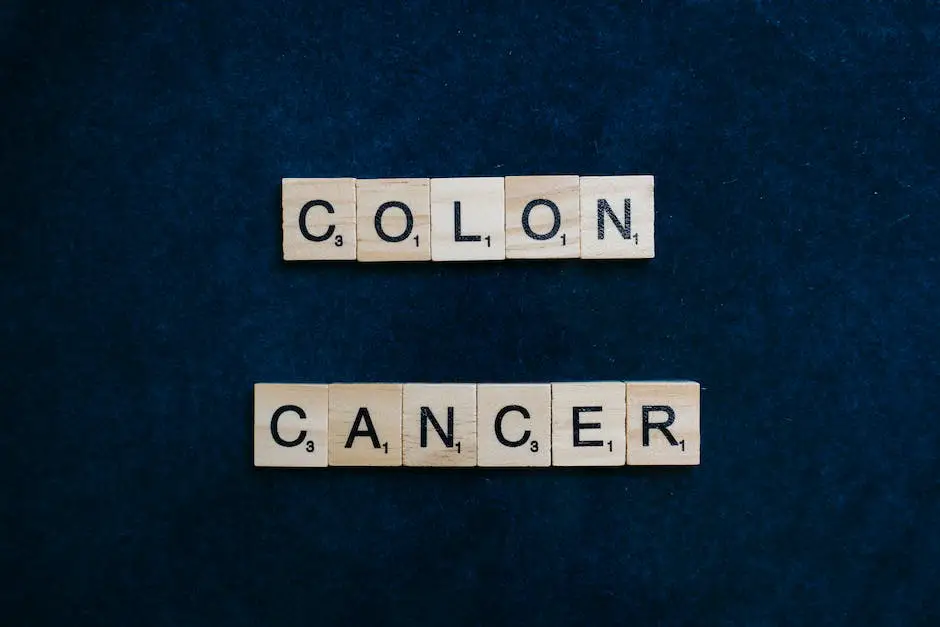Colon cancer stands as a major health concern worldwide, accounting for high incidence and death rates. This pervasive disease occurs when the cells lining the colon or rectum develop changes or mutations that allow them to grow and divide unchecked. As a grave public health issue, there is a pressing need to understand and recognize the risk factors linked to colon cancer. Factors such as age, family history, personal health history, and certain inherited syndromes play a critical role in predisposing individuals to the disease. Compounding these are lifestyle choices that can increase one’s risk. By drawing attention to these factors and endorsing proactive prevention strategies, this discussion aims to equip readers with the knowledge to identify potential risks and adopt methods to mitigate them.
What is Colon Cancer?
What is Colon Cancer?
Colon cancer, also known as colorectal cancer, originates in the colon or rectum. The colon is the final part of your digestive tract, which plays a crucial role in digestion and waste excretion. When malignant or cancerous cells develop in the colon, it leads to colon cancer. Undetected and untreated, it can spread to other parts of the body, making it one of the most common and deadly forms of cancer.
Understanding Risk Factors for Colon Cancer
Being aware of the various risk factors associated with colon cancer is crucial, as some of these factors are within our control, such as diet and lifestyle, while others, like age and genetics, are not. By gaining knowledge about these risk factors, we can potentially detect the disease early, prevent its occurrence, or even reduce the risk of its development.
- Age: Age plays a significant role in colon cancer risk. While it can strike at any age, it is most commonly diagnosed in people 50 years of age or older. The likelihood of developing colon cancer rises with advancing age.
- Diet: Eating habits are another malleable risk factor. A diet that includes fewer fruits and vegetables but is high in red and processed meats can intensify the risk of colon cancer. High-fat and low-fiber foods also enhance this risk.
- Physical Inactivity and Obesity: Neglecting regular physical activity and carrying excess weight can add to the risk of colon cancer. Regular exercise and weight management can help minimize this risk.
- Smoking and Alcohol Consumption: Using tobacco and consuming alcohol excessively are linked to a heightened risk of colon cancer.
- Personal and Family History: Having had colon cancer or non-cancerous colon polyps previously can put you at increased risk. Similarly, if a first-degree relative has been diagnosed with the disease, your risk escalates.
- Underlying Medical Conditions: Certain medical conditions and diseases such as inflammatory bowel disease (IBD)—including Crohn’s disease and ulcerative colitis, and inherited syndromes such as Familial Adenomatous Polyposis (FAP) and Lynch syndrome, increase the risk of colon cancer.
- Racial and Ethnic Background: When looking at racial statistics in the U.S., African Americans have the highest incidence and fatalities resulting from colon cancer. Ashkenazi Jews make up one of the highest risk groups globally.
Awareness and acknowledgement of these risk factors can lead to early detection and preventative measures that potentially save lives. If you identify with several of these risk categories, it’s recommended to communicate this with your healthcare provider. They can offer preventative methods or suggest early screening options.

Major Risk Factors of Colon Cancer
An In-Depth Look at Age as a Risk Factor for Colon Cancer
Age contributes greatly to the risk of colon cancer. Most notably, the disease is frequently diagnosed in older adults, with those aged 50 and up being the most affected. While not exclusively a disease of the elderly, approximately 90% of colon cancer cases are reported in individuals over 50, according to the American Cancer Society. Nonetheless, it is important to note that colon cancer in younger adults is also on the rise.
Family History and Colon Cancer Risk
People with a strong family history of colon cancer or rectal cancer are at a higher risk of developing the disease themselves. Having a first-degree relative (parent, sibling, or child) with the illness roughly doubles a person’s risk. However, most colon cancers are found in people without a family history.
Personal Health History
Personal health history is another crucial aspect to consider while assessing the risk of colon cancer. Individuals who have previously encountered benign (noncancerous) polyps in their colon or rectum are more likely to develop colon cancer. Also, a history of inflammatory bowel disease, like Crohn’s disease or ulcerative colitis, significantly increases a person’s risk. Another factor is having a previous occurrence of colon cancer; a cause for enhanced surveillance for future colon cancers.
Inherited Syndromes
Around 5% to 10% of colon cancers are due to inherited mutations that usually lead to familial cancer syndromes like Lynch syndrome or familial adenomatous polyposis (FAP). These genetic syndromes predispose a person to develop colon cancer and often at a young age.
Diet and Lifestyle
Several dietary and lifestyle factors have been linked to an increased risk of colon cancer. These include intensive consumption of red and processed meat, lack of regular physical activity, obesity, excessive alcohol consumption, and tobacco use. Modifying these lifestyle factors can help significantly reduce the risk of colon cancer.
Certain health conditions and treatments
Individuals with certain types of diabetes and those who have received radiation therapy aimed at the abdomen to treat previous cancers could be at a higher risk of developing colon cancer.
Ethnicity and Race
Some racial and ethnic groups, such as African Americans and Ashkenazi Jews, have a higher incidence of colon cancer. The reasons for these disparities are not fully understood yet but could involve a combination of genetic and environmental factors.
Understanding Colon Cancer Risk Factors
It’s important to understand that though certain risk factors may raise the probabilities of an individual developing colon cancer, they do not definitively imply that the person will contract the disease. There are cases where people with several risk factors remain unaffected, and conversely, individuals with no apparent risk factors may develop the disease. Therefore, recognizing risk factors is crucial, but it does not provide a definitive prediction of an individual’s probability of developing colon cancer.

Lifestyle Risk Factors for Colon Cancer
The Role of Diet in Enhancing or Mitigating Colon Cancer Risk
Several studies have established a clear connection between some dietary habits and the risk of developing colorectal cancer, also often referred to as colon cancer. Regular consumption of food items high in red and processed meats, for instance, beef, pork, lamb, sausages, bacon, and deli meats, may contribute to an increased risk. This is because ongoing exposure to these food types can generate harmful carcinogens. Conversely, a diet rich in foods packed with fiber, like fruits, vegetables, and whole grain, aids in the prevention of colon cancer.
Exercise and Colon Cancer Risk
Physical inactivity is a strong risk factor for colon cancer. Regular physical activity can reduce the risk of developing colorectal cancer by as much as 40%. Physically active people have a lower risk because exercise helps in maintaining a healthy body weight, enhance immune function, and speed up the transit time of waste, minimizing the exposure time to potential carcinogens.
Smoking and Colon Cancer Risk
Smoking tobacco products is another lifestyle risk factor for colon cancer. Current and former smokers are at a higher risk compared to non-smokers. This risk increases with the duration of smoking and the number of cigarettes smoked per day. The carcinogens in tobacco smoke can damage DNA, which can lead to the development of cancer cells.
Alcohol Consumption as a Risk Factor
Alcohol consumption, particularly heavy, long-term use of alcohol, also increases the risk of colon cancer. Alcohol can act as a carrier, enabling harmful chemicals to reach the lining of the colon, impair overall nutrient absorption, and potentially lead to DNA changes that may cause cancer.
Obesity and Colon Cancer Risk
Being overweight or obese significantly increases the chances of developing colon cancer. Obesity-induced inflammation and changes in hormonal and bile acid responses may play a vital role in cancer development. Excess body fat often results in higher insulin levels, which may promote the growth of colorectal cancer cells.
The Role of Genetics in Colon Cancer Risk
While most colon cancers are associated with modifiable lifestyle factors, genetic factors cannot be overlooked. About 5% to 10% of individuals with colon cancer have inherited gene defects that can lead to the disease.
It’s well understood that lifestyle choices can have a definite influence on the risk of developing colon cancer. By making smarter health decisions, it’s possible to counteract many of these risks. Simple changes, such as reducing consumption of red and processed meats, staying physically active, maintaining a balanced weight, avoiding smoking, moderating alcohol use, and embracing a diet rich in fiber can all aid in decreasing your risk of colon cancer.

How to Lower the Risk of Colon Cancer
Securing Your Health: The Importance of Regular Screenings
An extremely effective way to mitigate the risk of colon cancer is through regular screenings. These can help identify early warning signs of cancer, like polyps (abnormal growths on the inner lining of the colon), that can be removed before turning into cancer cells. The American Cancer Society suggests starting these routine checks from the age of 45. Individuals at a higher risk, for instance, those with a family history of colon cancer or those of African American descent, may need to commence their screenings at an earlier age.
Maintaining a Healthy Body Weight: An Effective Measure
Keeping a healthy body weight is another way to reduce the risk of colon cancer. Obesity increases the chance of developing and dying from colon cancer, especially in men. Opt for a balanced diet rich in fruits, vegetables, and whole grains to help maintain a healthy weight.
Active Lifestyle: A Positive Impact
Staying active can help protect against colon cancer. It’s essential to engage in regular physical activity, such as walking, jogging, or partaking in sports. This can reduce the risk of developing colon cancer by maintaining body weight and promoting efficient digestion.
Balanced Diet: A Crucial Role
Eating a nutritious, balanced diet plays a substantial role in lowering the risk of colon cancer. Dietary fiber, which is found in fruits, vegetables, and whole grains, aids in maintaining a healthy digestive system and could help prevent colon cancer. Meanwhile, limiting the intake of red and processed meats, which are linked with an increased risk of colon cancer, can also be beneficial.
Limiting Alcohol: An Important Step
Moderation is the key when it comes to consuming alcohol. Heavy alcohol use has been associated with a higher risk of colon cancer. If you choose to drink, try not to exceed the recommended limits – no more than two drinks a day for men and one drink a day for women.
Avoiding Tobacco: A Critical Preference
Tobacco use in any form, smoking or chewing, poses a significant risk of colon cancer. The longer a person uses tobacco, the higher the risk they have of developing colon cancer. Quitting tobacco use at any age can significantly improve health and lower the risk of various cancers, including colon cancer.
One additional preventive strategy includes taking aspirin or anti-inflammatory drugs, such as ibuprofen or naproxen, which may potentially reduce colon cancer risk. However, these should only be taken with a doctor’s consultation, as they have their own side effects and risks.
Genetic Counseling and Testing
If you have a strong family history of colon cancer or other types of cancer, genetic counseling may be useful to determine your risk. Through various tests, this counseling can help you understand your familial risk and provide you with effective measures to take. However, genetic testing should only be done at the recommendation of a healthcare provider.

Our collective fight against colon cancer is entrenched in our understanding of the intrinsic and lifestyle risk factors that tilt the scales towards disease onset. Creating inroads into disease prevention fundamentally hinges on knowledge and the resulting measures we take. As we delve into our genetic predispositions, personal health history, and lifestyle choices, we unravel the causative strings tied to colon cancer. Taking action through regular screenings, maintaining a healthy body weight, physical activity, balanced nutrition, and restraint on alcohol and tobacco consumptions won’t just lower the risk but will also endow us with an overreaching shield of health and longevity. Remember, awareness is our first line of defense against colon cancer. Arm yourself with it, and begin a journey towards a healthier, risk-mitigated life.
